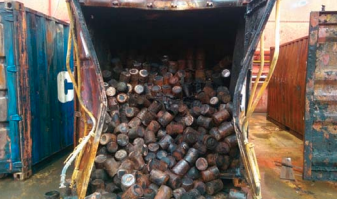Act eary to secure contracts
This article was first published in the November / December 2019 edition of IT&O magazine. A PDF copy can be found here.
In the last of three articles for IT&O, Martin Bjerregaard – director of decommissioning, dismantling and salvage waste management at D3 Consulting Ltd – discusses the complexities of contracting the management of waste from salvage jobs In the previous two articles on waste management in salvage operations, we dealt with understanding what the waste is and the various technology options for handling that waste. This time, we discuss contracting and implementing the waste management part of a salvage contract, with a focus on streamlining these elements in order to create a sound basis for future works.
At the outset of a salvage contract which is expected to generate larger and/or more complex wastes, it is optimal to have early engagement with a number of waste management parties, namely:
- The regulatory bodies for where the waste could be brought onshore, in order to understand their requirements as regards permitting and licensing;
- The port to which the waste can be brought, to assess whether there is suitable space for receiving and managing the waste, and
- Waste management contractors, either local or regional, depending on the type and quantities of waste involved.
Early engagement with potential waste management contractors is beneficial even before the waste has been characterised, as their involvement in initial segregation and handling of the waste – as well as any damaged cargo – can lead to cost and time savings further down the line.
Contracting the waste management industry to handle the waste can be complex, since there will be numerous unknowns associated with the waste that would need to be taken into account in the structure of the contract. For example, will the waste be consistent with the first wastes removed and characterised? Is there robust capacity for dealing with certain types of waste in the supply chain, or could there be a risk of delays? Can the necessary permits and licences be in place before the first waste is received onshore?
Where the national waste management industry is not able to deal with a hazardous waste, and the national competent authority confirms this to be the case, then the hazardous waste can be exported under the Basel Convention to another country with the required capability and capacity, as long as the recipient national competent authority approves it.
Gaining these approvals and implementing the export of hazardous waste under the Basel
Convention can be a convoluted process, so early engagement with the respective regulators is key.
There is a growing global waste regulatory approach for the owners of the waste – more often than not the shipping line themselves – to have a duty of care in ensuring that the waste is managed competently and appropriately throughout the supply chain. This means the owners of the waste are responsible for ensuring that the whole supply chain is capable, licensed and has the capacity to deal with the waste all the way through to the end disposition. This can be complex when there are numerous local, regional and national laws to comply with!
With increasing attention being paid to sound environmental protection, the salvage industry is looking towards improved waste management – especially when working within the marine environment. This is reflected in recent advances such as at Ardent, where Asia director Bas Michiels explained: “At Ardent we have developed an integrated salvage and waste offering for our clients that can lead to cost savings, as well as environmentally responsible solutions.”
Once all these aspects are in place and known, a comprehensive contract can be put in place which allows for flexibility in waste variations as the salvage operations progress; this also reduces the risk exposure for the shipping line, insurers and salvor.
During the implementation of the contract, it is key to track all wastes received, how they were initially characterised and their onward routing for recycling, waste treatment or disposal. On completion of the works, such documentation is needed under duty of care, and for records, as part of the salvage contract – bearing in mind that keeping on top of all the wastes received, their quantities, segregation and processing, and subsequent onward routing, can be complex.
CONTACT D3 CONSULTING
If you'd like to discuss your requirements with on of the team, please do call the office on +44 (0)1803 840888.
Sign up with your email address to receive news and updates.
We respect your privacy.

